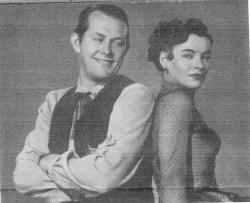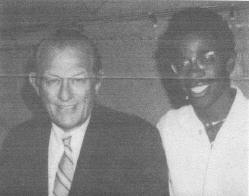
With
Ella Raines in Singing Guns (1950)
The singing idol and
bandleader of the forties and fifties was born on October 7, 1911, in Akron,
Ohio. At the age of fourteen Vaughn won a state trumpet contest. After
graduating from high school in Jeannette, Pennsylvania, he enrolled at
Carnegie Tech where he majored in voice, but he left college in 1933 to join a
band. When the band broke up in 1935 he went with Larry Funk's group as a
trumpeter and vocalist. After a year Jack Marshard offered Monroe the
leadership of his band. The arrangement worked well for four years, but in
1940 Vaughn formed his own band and Marshard went with him as manager. Also
that year, he played the Paramount Theatre for the first time, made his radio
debut, and married his childhood sweetheart, Marian Baughman.
By the time Vaughn
Monroe played Meadowbrook in the spring of 1941 he was well on his way to
making it very big. In less than a year the country's top disc jockey, the
late Martin Block, placed Monroe's band among the top twenty in his WNEW poll.
He also had his own radio show in the forties and began making appearances in
such films as Meet the People (1944) and Carnegie Hall (1947) . And his band
continued for ten years to roll up attendance records at the country's top
spots, including New York's Commodore Hotel and Strand Theatre. Vaughn was the
first to record "There, I've Said It Again," which has sold over 2-1/2 million
records. The second biggest hit in his career is "Ghost Riders in the Sky," a
4-1/2 million seller. One of the recording industry's all-time successes is
the Vaughn Monroe vocal of "Ballerina," which has just passed the 5 million
mark. The one hit he didn't have--because he turned it down--was the perennial
best-seller "Rudolph the Red-Nosed Reindeer."
Although the Monroe
aggregation developed into quite a good band, its leader was the main
attraction. Vaughn's big, deep baritone drew not only bobby-soxers but young
married women, and more than a few matrons. But not everyone dug Monroe.
Detroit's most popular disc jockey, Jack the Bellboy, made jokes about his
squareness and pomposity daily, but he played his records just the same. No
real personality was ever revealed by Monroe in his performances, and in his
interviews he never drops the professional image, answering all questions with
the pronoun we.
Vaughn has starred in
two Republic westerns, Singing Guns (1950) and Toughest Man in
Arizona (1952) , and appeared with his band on CBS- TV from October 1950
to July 1951. They were back on NBC-TV for a short period in 1954.
In 1953 the Monroe
entourage disbanded, including the Moonmaids, a female singing group, and he
set out as a single. The band business had been slipping and he wanted to
spend more time with his wife and two daughters. Along with playing clubs, for
several years Vaughn acted as TV spokesman for RCA products on the company's
TV commercials--a very lucrative venture for him. In 1967 he played the
Rainbow Grill in Manhattan and in 1970 was featured at the St. Regis. He still
commands a sizable fee for private parties but admits his audiences are made
up of "those who remember, not the kids."
Vaughn, who lives in
Jensen Beach, Florida, can well afford to spend most of his time sail fishing
and playing golf. He has a solid marriage and several gold records that have
earned a great deal of money. But his original goal, grand opera, has always
eluded him. He seems to have little interest in
popular music or performers and admits that after all these years in the
business he has not made any close show biz friends. "We had some good friends
among the bookers, though," he allowed during a recent radio interview.

At
an interview with Michael Knowles
during
Vaughn's recent trip to Manhattan.
photo by
Ronnie Britton